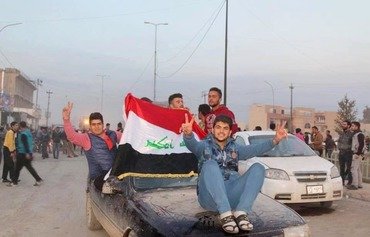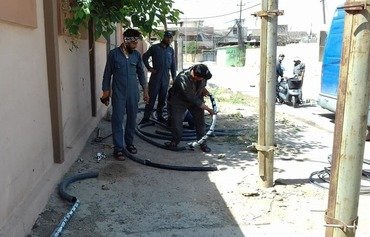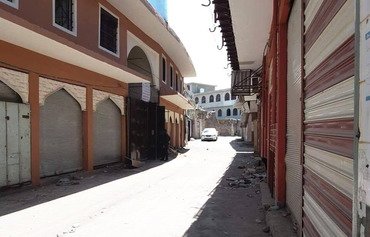In Mosul's liberated neighbourhoods and surrounding towns, normal life is gradually returning as residents reopen their businesses and services are restored, local officials tell Diyaruna.
Qadir Hassan, who lives in al-Zuhour in the east of the city, said he has reopened his shop after he had been forced to close it due to the fighting.
"There is sustained security now, and the army has full control after the terrorists have been driven out," he told Diyaruna. "Many shops have reopened their doors and shopping activity is recovering quickly."
Residents are once again going about their business without fear and there is general optimism that life will go back to the way it was before ISIL overran the city two years ago, he added.
"We have received aid relief and the security forces are helping us, but we are suffering from a lack of drinking water and electricity and from poor health services," he said. "I hope the reconstruction efforts will help end our suffering."
Gradual restoration of services
The local government is doing everything in its power to ease the residents’ plight and provide for their most pressing needs, despite the current security situation, said Duraid Hikmat, an adviser to the Ninawa governor.
"We have a project that divides the city of Mosul into eight sectors for service activity, four on the left bank of the Tigris and four on the right bank," he told Diyaruna.
Each sector will have a work committee that includes teams from various service areas to maintain and repair damaged facilities and restore basic services for the population, he said.
"Our engineering and technical personnel have started working in al-Zuhour neighbourhood sector, since it is the one of the safest liberated residential neighbourhoods and is out of range of ISIL shelling," he said.
"We are delivering drinking water to the residents with tanker trucks as a temporary solution until we finish repairing the damaged water sub-stations and delivery lines and liberate all primary water facilities still in ISIL’s grip," he said.
The local government is also working to provide electricity by providing fuel for private generators, repairing distribution networks and damaged generators, and restoring electric power at full capacity after securing power supply from Mosul Dam, Hikmat added.
"Our efforts are yet to rise to the desired level, but the battle to liberate the city still has not ended," he said. "The right bank is under the terrorists’ control, and some liberated neighbourhoods are not fully secured from mines and improvised explosive devices (IEDs)."
"We also suffer from a lack of financial resources required for reconstruction," he said, adding that "despite these challenges, we will continue working with the resources available to us".
Many challenges remain
Life remains difficult in liberated neighbourhoods of Mosul and the surrounding towns, said Ninawa provincial council member Hassan Shbeib.
"The local government, alongside all other ministries and humanitarian organisations, is trying to overcome all difficulties and set up some of the vital services for the local population," he told Diyaruna.
"ISIL, after all the losses it had suffered, tried to attack service facilities and cut off water and electricity to liberated areas to complicate the humanitarian crisis and infuse confusion into the battle," he said.
"These challenges require all official and non-governmental parties to mobilise all of their resources to help the population, improve its living conditions, and create appropriate conditions for the return of displaced citizens," he added.
Since the operation to liberate Mosul began in October, some 16,000 people have returned to their homes in the city and its outskirts, Deputy Minister of Migration and Displacement Jassim al-Atiyya told Diyaruna.
But the displacement of population from fighting zones continues with close to 140,000 people currently living in camps scattered around Mosul.
"We spare no effort to help returning residents, providing them food and relief materials," he said, noting that the security forces are helping to transport people back to the liberated areas.
"As for displaced families, our services to them are ongoing," al-Atiyya added. The ministry has erected 50,000 tents as part of its urgent shelter plan, and has started to set up 20,000 new tents in southern Mosul to accommodate any new waves of displacement.
"We are providing the displaced with food and drink and the blankets, mattresses, cooking needs, heaters and fuel they need," he said. "We seek to remedy all emergencies early on."

![Two workers try to fix an electricity cable in Ninawa province, where services are being restored in areas liberated from the 'Islamic State of Iraq and the Levant'. [Photo courtesy of Ninawa province media Facebook page]](/cnmi_di/images/2016/12/29/6909-iraq-ninawa-electricity-600_384.jpg)






